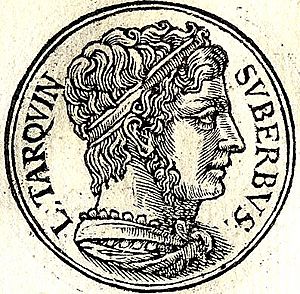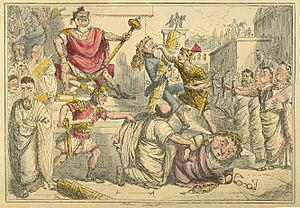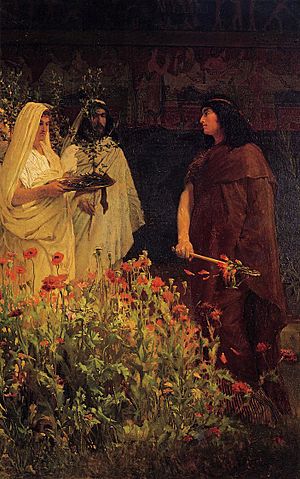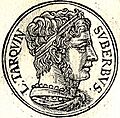Lucius Tarquinius Superbus facts for kids
Quick facts for kids Lucius Tarquinius Superbus |
|
|---|---|

Lucius Tarquinius Superbus, 16th-century depiction published by Guillaume Rouillé
|
|
| King of Rome | |
| Reign | 534–509 BC |
| Predecessor | Servius Tullius |
| Successor | Lucius Junius Brutus, Lucius Tarquinius Collatinus as Consuls |
| Born | Rome |
| Died | 495 BC Cumae |
| Spouse |
|
| Issue |
|
| Father | Lucius Tarquinius Priscus (possibly grandfather) |
| Mother | Tanaquil |
Lucius Tarquinius Superbus (died 495 BC) was the seventh and final king of Rome. He ruled for 25 years until a big uprising led to the creation of the Roman Republic. People often called him Tarquin the Proud. This name came from his Latin nickname Superbus, which means "proud" or "arrogant."
His time as king was very strict. This led the Romans to decide they no longer wanted kings.
Contents
Who Was Tarquin the Proud?
Ancient stories say Tarquin was the son of Tarquinius Priscus, an earlier Roman king. However, some historians today think he might have been Priscus's grandson. This is because of the timeline of events.
His mother was supposedly Tanaquil. She was a clever woman who helped her husband, Tarquinius Priscus, become king. Later, when Priscus was killed, Tanaquil helped Servius Tullius become the next king. Servius Tullius was chosen over her own sons or grandsons.
Tarquin the Proud later married Servius Tullius's daughter, Tullia Minor. They had three sons: Titus, Arruns, and Sextus. They also had a daughter named Tarquinia.
Tullia encouraged her husband, Tarquin, to become king. She even pushed him to take the throne from her own father, King Servius. After Servius was killed, Tullia was the first to call her husband the new king.
Tarquin's Rule as King

Early in his rule, Tarquin started a war against the Volsci people. He captured their rich town of Suessa Pometia. After this victory, he began building the Temple of Jupiter Optimus Maximus. This temple was originally promised by an earlier king, Tarquin the Elder.
Next, Tarquin fought a war with Gabii, a Latin city that refused to make a treaty with Rome. He couldn't capture the city by force. So, Tarquin used a clever trick. His son, Sextus, pretended his father had treated him badly. He even showed fake whip marks and fled to Gabii. The people of Gabii believed him and put him in charge of their army.
When Sextus had their full trust, he sent a message to his father. He asked how he should take over the city. King Tarquin was in his garden. He didn't say anything, but he cut off the heads of the tallest poppies with his stick. Sextus understood the hint. He killed or exiled all the important leaders in Gabii. After that, it was easy for him to make the city surrender to Rome.
Tarquin also made peace with the Aequi people. He renewed Rome's peace treaty with the Etruscans. He won a battle against the Sabines. He also started new Roman towns at Signia and Circeii.
In Rome, Tarquin made many changes. He flattened the top of the Tarpeian Rock to make space. He also removed old shrines to build the Temple of Jupiter Optimus Maximus on the Capitoline Hill. He built seats in the circus for spectators. He also ordered the digging of Rome's great sewer, the cloaca maxima.

How Tarquin Was Overthrown
By 509 BC, the Roman people were tired of Tarquin's constant building projects. These projects were expensive and hard on the citizens. So, Tarquin started a war against the Rutuli people. The Rutuli were very wealthy. Tarquin hoped to win a lot of treasure to make his people happier. He tried to capture their capital city, Ardea, but failed. So, he decided to surround the city and wait.
However, the king's unfair rule led to a rebellion in Rome. Tarquin was forced to leave the city and go into exile. Instead of a king, the Roman people decided to elect two leaders called consuls. These consuls would share power. The first consuls chosen were Brutus and Collatinus.
Tarquin tried to get help from his friends in Etruria. The cities of Veii and Tarquinii sent soldiers to join his army. He prepared to march back to Rome. Meanwhile, Brutus got an army ready to stop him. Brutus then asked his fellow consul, Collatinus, to step down. Collatinus had the hated name of Tarquinius. Collatinus was surprised but agreed to leave Rome.
The king sent messengers to the Roman senate. They pretended to ask for his personal belongings back. But their real goal was to secretly turn some Roman leaders against the new government. When this plot was discovered, the guilty people were punished by the consuls. Brutus even had to condemn his own two sons to death because they were part of the plan.
At the Battle of Silva Arsia, the Romans fought a tough battle against Tarquin and his Etruscan allies. Both sides lost many soldiers. Consul Brutus and his cousin, Arruns Tarquinius, died fighting each other.
After this defeat, Tarquin asked Lars Porsena, the king of Clusium, for help. Porsena marched on Rome. The brave defense by the Romans became famous, with stories like Horatius at the bridge and the courage of Gaius Mucius Scaevola. It's not fully clear if Porsena entered Rome or was stopped. But most historians think he might have briefly taken the city before leaving. In the end, his efforts did not help Tarquin get his kingdom back.
Tarquin's last attempt to regain the Roman throne happened around 499 or 496 BC. He convinced his son-in-law, Octavius Mamilius, to lead a Latin army against Rome. The Roman army was led by Albus Postumius Albus. The elderly king and his last son, Titus Tarquinius, fought alongside the Latins. This battle was also very difficult, with many losses on both sides. Mamilius was killed, and Titus Tarquinius barely escaped. The Latins eventually left the battlefield, and Rome remained free.
After this final defeat and the death of his son-in-law, Tarquin went to live with Aristodemus in Cumae. He died there in 495 BC.
Images for kids
-
Tarquinius Superbus makes himself King; from The Comic History of Rome by Gilbert Abbott à Beckett (c. 1850s)
-
Tarquinius Superbus by Lawrence Alma-Tadema, depicting the king receiving a laurel; the poppies in the foreground refer to the "tall poppy" allegory
See also
 In Spanish: Tarquinio el Soberbio para niños
In Spanish: Tarquinio el Soberbio para niños
 | William L. Dawson |
 | W. E. B. Du Bois |
 | Harry Belafonte |




